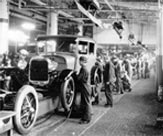Marty Mulloy, VP Labor Affairs, talks about Bringing In Jobs
2011: Navigating The Current Economic Landscape
A Slow Recovery
Eight months ago, the American economy seemed to be carrying a good deal of momentum heading into 2011, and that momentum was reflected in a rising stock market, improved corporate earnings and a general sense of confidence that the positive economic news would most likely continue throughout the year. The jobs picture, in particular, showed signs of improving for the first time in years.
Today, as we look back on the Second Quarter, that early 2011 optimism has waned and a much more cautionary outlook has taken hold. At Ford we recognize there are continuing issues, but we do not share many of the dire predictions of some opinion leaders. Regardless, as a company we are impacted by what is happening with the economy, which in 3Q 2011 clearly continues to face some major challenges. For example, we are particularly interested in the jobs outlook, because greater unemployment and job insecurity translate into fewer auto sales.
The Combination of Two Major Shocks
The economic effects of the March 11 earthquake in Japan are still rippling through the global economy. While Ford wasn’t impacted to the same extent as other major U.S. manufacturers by supply disruptions, key manufacturers in several industries felt the effects.
Even before March 11, the run-up in oil prices was adding pressure to the global economy. At the start of the year, no one had predicted this dramatic rise in oil prices. And, of course, no one expected an event on the scale of the Japan disaster. The combination of these two major shocks, overlapping as they did, pared the momentum and optimism we were seeing earlier in the year.
Ongoing Uncertainty
This uncertainty is clearly impacting both consumers and businesses. In a recent editorial entitled Blundering Toward Recession: The debt limit stalemate is just one of the problems, The New York Times cited a “a lack of consumer demand in the face of stagnant wages, job uncertainty and the continuing payback of household debt from the bubble years. Without strong and steady consumer demand, businesses will not hire, and a self-sustaining recovery cannot take hold.”
New Forecasts for Growth
Those tracking economic growth have been forecasting downward for weeks. At the end of the first quarter, Goldman Sachs projected growth at a strong 4 percent annual rate by the end of the second quarter. Now they expect the government to report no more than 2 percent growth for the second quarter. Ben Bernanke recently commented that “some of these headwinds may be stronger and more persistent than we thought…we don’t have a precise read on why this slower place of growth is persisting.”
For the auto industry, these headwinds are impacting sales in significant ways. The 2011 Automotive Outlook estimates that just 12.7 million cars, trucks and crossovers will be sold this year. Earlier industry forecasts had estimated well above 13 million. The industry’s peak sales reached 17 million a decade ago.*
How Ford Is Planning For This Uncertain Future
Throughout the recession Ford had a comprehensive plan, and we’ve been working very aggressively to deliver it. The fact that we recognized the need for change and took swift action before the government restructuring of our industry continues to set Ford apart.
In addition, Ford’s role in our nation’s economic recovery continues to be significant. Automotive after the first two quarters of 2011 represents 2.7 percent of total GDP, according to the U.S. Department of Commerce (Bureau of Economic Analysis). That’s just the direct impact and doesn’t include the indirect impact of supply chain production and dealer activity. In total, automotive represents a huge economic force working toward our recovery.
Throughout the financial crisis and its aftermath, economists have emphasized that recovering from a crisis of this kind takes far more time than recovering from a normal cyclical recession. Ford understands the impact this slow recovery can have on our business, which is why we haven’t lost any focus or urgency in keeping our operations as competitive as they can be around the globe. We’re making sure production matches customer demand in every region and in every market where we do business.
Competitiveness is key. Now and into the future.
* The 2011 Automotive Outlook is a study by Detroit-based AlixPartners












